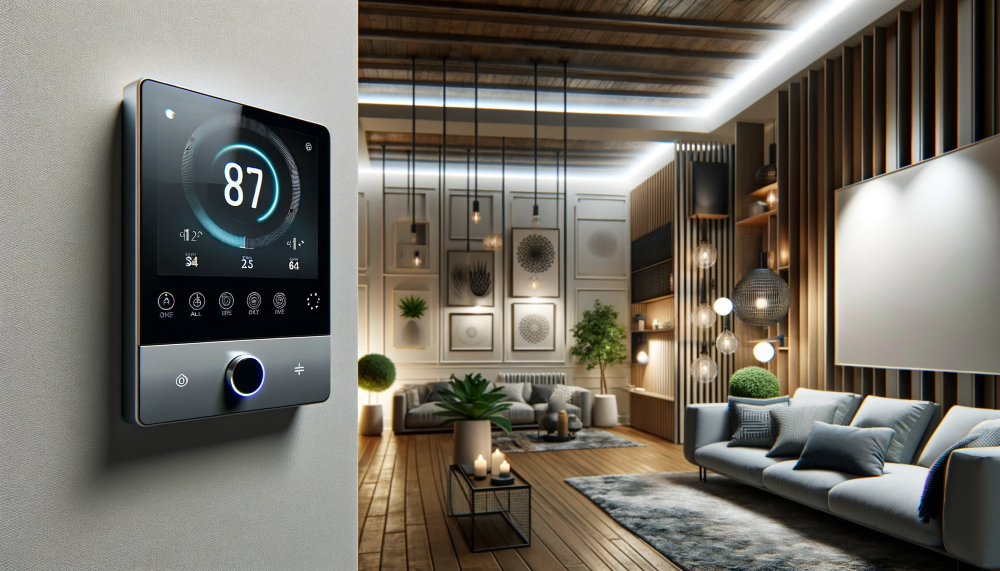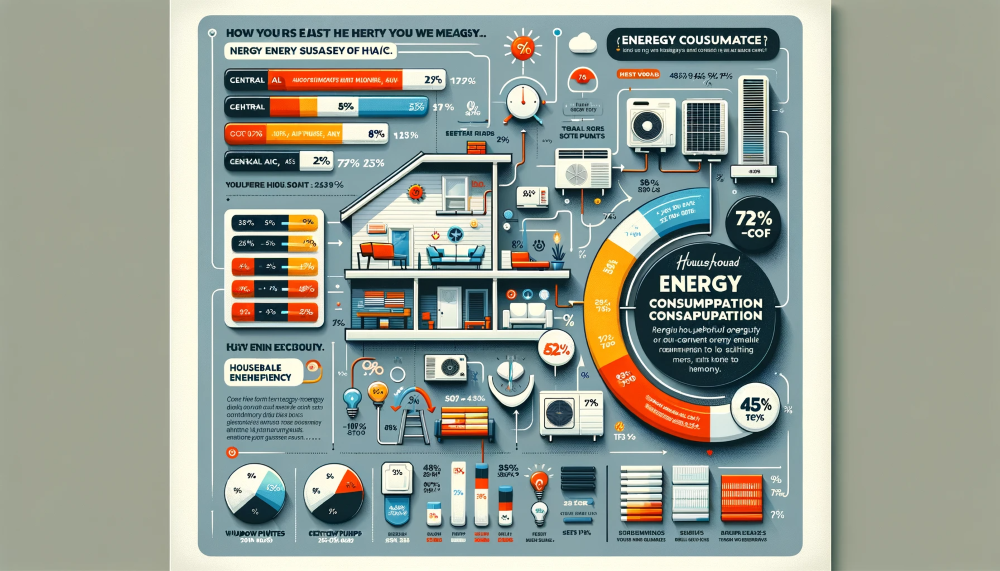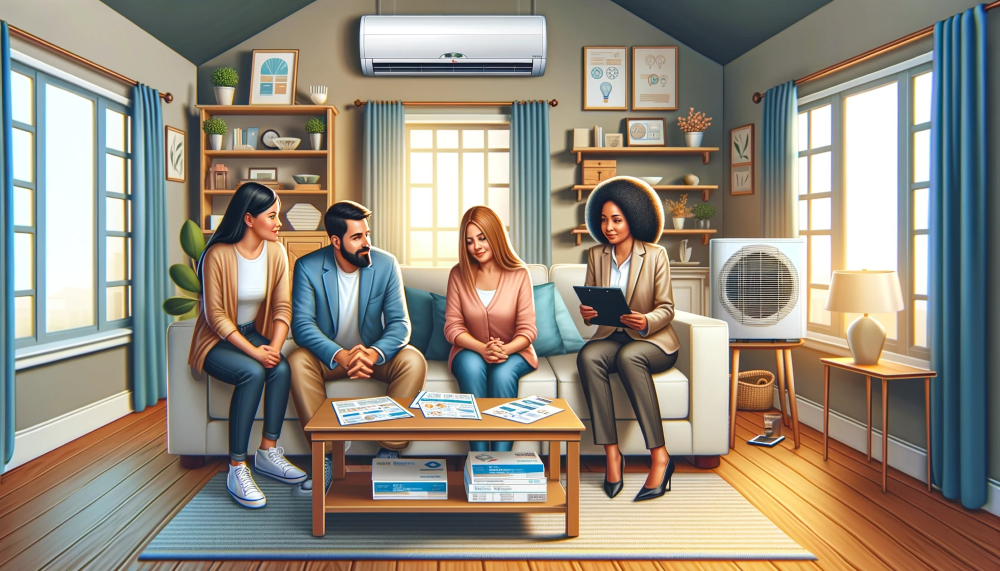Smart Home HVAC Solutions
Introduction
In today's world, where energy efficiency and smart technology are at the forefront of home innovation, smart HVAC systems are becoming increasingly crucial for homeowners. These advanced systems are revolutionizing the way we approach heating, ventilation, and air conditioning, offering unparalleled comfort, convenience, and energy savings. Smart HVAC systems are more than just an upgrade; they represent a significant leap forward in how we manage our home environments. From seamlessly adjusting temperatures to optimizing energy use, these systems are designed to enhance the quality of life while helping homeowners save energy and reduce their carbon footprint. In this blog post, we'll explore the world of smart HVAC systems, understanding their functionality, benefits, and the essential role they play in modern homes. Whether you're looking to upgrade your existing air conditioning system or are curious about the latest advancements in home technology, this guide will provide you with all the information you need to make informed decisions about smart home HVAC solutions.
Understanding Smart HVAC Systems
The concept of a smart home is rapidly evolving, and at the heart of this revolution are smart HVAC systems. These systems are a significant leap from traditional heating, ventilation, and air conditioning units, integrating seamlessly with smart home devices to provide unparalleled comfort and efficiency.
What is a Smart HVAC System?
A smart HVAC system is a technologically advanced approach to indoor climate control. Unlike conventional systems, a smart HVAC system is equipped with sensors and connected to the internet, allowing it to communicate with other smart devices in a home. This connectivity enables a range of functionalities that were once thought impossible, from remote control via smartphones to automated adjustments based on real-time environmental data.
Evolution of HVAC to Smart Technology
The journey from traditional HVAC systems to their smart counterparts marks a significant milestone in home automation. The integration of smart technology into HVAC systems is a response to the growing demand for more efficient, user-friendly, and environmentally responsible solutions. This evolution is part of the broader trend of incorporating smart devices into every aspect of our daily lives, from smart thermostats to AI-powered maintenance predictions.
Key Components of Smart HVAC Systems
The backbone of a smart HVAC system lies in its components. At the forefront is the smart thermostat, a device that has revolutionized the way we interact with our home’s heating and cooling systems. Smart thermostats learn from your habits and preferences to optimize temperature settings, leading to enhanced comfort and energy savings. Other components include smart vents that can open or close to regulate airflow in different rooms and sensors that monitor air quality, temperature, and humidity levels.
Benefits of Upgrading to a Smart HVAC System
Upgrading to a smart HVAC system offers a multitude of benefits. These systems provide greater control over indoor climate, adapt to your lifestyle, and contribute significantly to energy efficiency. Homeowners can enjoy reduced energy bills, a smaller carbon footprint, and the convenience of controlling their HVAC systems through their smart home devices. Moreover, smart HVAC systems often come with predictive maintenance capabilities, alerting homeowners to potential issues before they escalate into costly repairs.
In conclusion, smart HVAC systems represent the future of home climate control. By leveraging the power of smart thermostats and other smart home devices, these systems offer an unparalleled combination of comfort, efficiency, and control. As we move towards more connected and intelligent homes, the adoption of smart HVAC systems will undoubtedly continue to grow, reshaping our approach to home environment management.
How Smart HVAC Systems Promote Energy Efficiency
In an era where energy usage and efficiency are pivotal, smart HVAC systems stand out as a beacon of innovation, offering significant energy savings and optimizing energy consumption in ways traditional systems simply cannot match. This section delves into how these intelligent systems can be game-changers in reducing energy bills and contributing to a greener planet.
Smart HVAC Systems and Energy Savings
Smart HVAC systems are designed with energy efficiency as a core principle. By utilizing advanced technologies such as AI and machine learning, these systems can analyze patterns in your energy usage, automatically adjusting to the most efficient settings without compromising on comfort. This intelligent adaptation not only ensures consistent indoor climates but also contributes to significant energy savings over time.
Energy-Efficient Features of Smart HVAC Systems
The efficiency of smart HVAC systems lies in their features that are specifically tailored for optimizing energy consumption. For instance, smart thermostats can adjust the temperature based on whether the house is occupied or empty, reducing unnecessary heating or cooling. Additionally, these systems can provide homeowners with detailed energy usage reports, helping them understand and manage their consumption more effectively. Features like zoned heating and cooling, where different areas of a home can have individual temperature settings, also play a crucial role in reducing overall energy use.
Real-World Impact
Smart HVAC systems have significantly impacted various sectors by enhancing efficiency, reducing energy consumption, and improving indoor air quality. Here are three case studies illustrating their impact:
Commercial Buildings - Energy Efficiency and Cost Savings: In a large office building, a smart HVAC system was installed to replace an outdated system. The new system utilized sensors and artificial intelligence to optimize temperature and air flow, resulting in a 25% reduction in energy usage. This led to substantial cost savings and a decrease in the building's carbon footprint. Additionally, employees reported improved comfort and productivity due to the consistent and optimized indoor climate.
Healthcare Facilities - Improved Air Quality and Patient Comfort: A hospital implemented a smart HVAC system to enhance indoor air quality and patient comfort. The system was designed to adjust the temperature and humidity levels in different areas, like patient rooms, operating theatres, and common areas, based on occupancy and specific needs. This resulted in a healthier environment with reduced risk of airborne infections, and increased patient and staff satisfaction. Energy consumption was also reduced due to the system's efficiency in managing air flow and temperature.
Educational Institutions - Customized Learning Environments: A university deployed a smart HVAC system across its campus, including classrooms, libraries, and dormitories. The system was programmed to adjust conditions based on occupancy, time of day, and external weather conditions. In classrooms, this created an optimal learning environment, leading to improved student concentration and performance. In dormitories, students could customize their room's climate, enhancing comfort and living experience. The university also saw a significant reduction in energy costs and contributed to sustainability goals.
These case studies demonstrate the versatile benefits of smart HVAC systems in different environments, showcasing their ability to enhance comfort, improve air quality, and optimize energy usage.
Long-Term Savings and Environmental Benefits
Investing in a smart HVAC system is not just about immediate comfort; it's also a wise financial decision in the long run. By significantly reducing energy usage, these systems help homeowners save money on their utility bills. Moreover, the reduced energy consumption has a broader impact, contributing to decreased greenhouse gas emissions and aiding in the fight against climate change. Thus, a smart HVAC system is not just a home upgrade; it's a step towards a more sustainable and responsible way of living.
In summary, smart HVAC systems are at the forefront of optimizing energy consumption in homes. They offer a dual benefit: enabling significant energy savings while also helping homeowners save money. As technology continues to advance, these systems will become even more integral to creating efficient, cost-effective, and environmentally friendly living spaces.
The Role of Smart Thermostats in HVAC Systems
Smart thermostats are the linchpin of smart HVAC systems, seamlessly integrating with other smart home devices to revolutionize how we manage the climate in our living spaces. This section explores the pivotal role of smart thermostats in enhancing the functionality of HVAC systems and providing homeowners with unprecedented control and convenience.
Overview of Smart Thermostats
Smart thermostats are advanced devices that go beyond mere temperature regulation. They are the central control points for smart HVAC systems, capable of learning and adapting to your temperature preferences and routine. These devices connect to the internet, enabling them to be part of a broader network of other smart devices in the home. With their sleek design and intuitive interfaces, smart thermostats not only add to the aesthetic appeal of living space but also bring a high level of functionality and efficiency.
Integration with Other Smart Home Devices
One of the most significant advantages of smart thermostats is their ability to work in tandem with other smart home devices. For example, they can communicate with smart window blinds to adjust the amount of sunlight entering a room, thereby helping to control the indoor temperature more effectively. They can also work with smart lighting systems to create an ambiance that complements the temperature settings, enhancing the overall comfort of the living space.
Remote Control and Customization
The ability to remotely control your home’s temperature is a game-changer in home climate management. With a smart thermostat, you can adjust the settings from anywhere using a smartphone or tablet. This feature is particularly useful for making sure your home is at the perfect temperature when you arrive or for adjusting settings when you are away, ensuring energy is not wasted on an empty house. Furthermore, smart thermostats allow for detailed customization, enabling you to set specific temperature preferences for different times of the day or different rooms, tailoring the climate to suit every part of your living space.
Enhanced Comfort and Energy Efficiency
By learning your temperature preferences and routine, smart thermostats can automatically adjust the settings to ensure maximum comfort while minimizing energy usage. They can detect when rooms are unoccupied and adjust the temperature accordingly, or they can pre-heat or cool your home just in time for your arrival. This not only enhances the comfort level of your living space but also contributes significantly to energy savings, as the HVAC system operates only when needed and at optimal settings.
In conclusion, smart thermostats are much more than just temperature regulators; they are the central hub for creating a smart, energy-efficient, and comfortable living environment. Their ability to integrate with other smart home devices and provide remote control and customization options makes them an essential component of modern smart HVAC systems. As we move towards more connected homes, the role of smart thermostats in managing our living spaces will become increasingly important.
Cost-Benefit Analysis of Smart HVAC Systems
Smart HVAC systems, equipped with intelligent devices and advanced control mechanisms, represent a significant investment in home heating and energy management. This section provides a cost-benefit analysis, helping homeowners understand the financial implications and long-term benefits of these systems.
Initial Investment vs. Long-Term Savings
The upfront cost of a smart HVAC system can be higher than that of a traditional system. This is due to the advanced technology, such as smart sensors and intelligent devices, that make up these systems. However, the long-term savings potential is substantial. Smart HVAC systems are designed for optimal energy efficiency, which translates to lower monthly energy bills. Over time, these savings can offset the initial investment, making the smart HVAC system a cost-effective choice for homeowners.
Comparison with Traditional HVAC Systems
When compared to traditional HVAC systems, smart systems offer enhanced HVAC control and energy management capabilities. While traditional systems operate on basic settings without the ability to learn and adapt, smart HVAC systems use intelligent devices and sensors to tailor heating and cooling patterns to the homeowner's lifestyle. This adaptability not only improves home comfort but also ensures that energy is not wasted, leading to more efficient operation and cost savings.
Government Incentives and Rebates
In many regions, homeowners who install energy-efficient systems like smart HVACs may be eligible for government incentives or rebates. These programs are designed to encourage energy-efficient home improvements, making it more affordable for homeowners to upgrade to smart HVAC systems. Homeowners should research available incentives in their area, as this can significantly reduce the overall cost of installation.
Choosing the Right Smart HVAC System for Your Home
Selecting the right smart HVAC system is crucial for maximizing the benefits of this technology. This section guides homeowners through the process of choosing a system that best fits their needs.
Factors to Consider When Selecting a Smart HVAC System
When choosing a smart HVAC system, several factors need to be considered. The size of the home, the climate in the area, and the specific heating and cooling needs of the household are all important. Additionally, the compatibility of the system with other smart home devices and the quality of HVAC control it offers should also be taken into account.
Tips for Upgrading Your Home Heating System
For those looking to upgrade their home heating system to a smart HVAC, it's important to conduct thorough research and seek professional advice. Comparing different models, understanding the specifications of each system, and considering how well they integrate with existing smart home devices are key steps in the selection process. It's also important to choose a system with reliable smart sensors and intelligent devices for effective energy management.
Recommendations for Top Smart HVAC Systems
The market offers a variety of smart HVAC systems, each with its own set of features and benefits. While the best choice will depend on individual needs and preferences, some systems stand out for their efficiency, user-friendly interface, and robust HVAC control capabilities. It's beneficial for homeowners to look at customer reviews, expert opinions, and manufacturer reputations when making their decisions.
In conclusion, while the initial cost of a smart HVAC system can be higher than traditional systems, the long-term savings, enhanced comfort, and improved energy management capabilities make it a worthwhile investment. Choosing the right system requires careful consideration of various factors, but with the right information and guidance, homeowners can make an informed decision that enhances their living experience and contributes to a more sustainable future.
Installation and Maintenance of Smart HVAC Systems
The final step in embracing the future of home climate control involves the proper installation and maintenance of smart HVAC systems. These automated systems, with their seamless integration and advanced features, require careful installation and regular maintenance to ensure they operate at peak efficiency.
Guide to Installing Smart HVAC Systems
Installing a smart HVAC system is more complex than setting up traditional heating and cooling systems due to the integration of motion sensors, voice assistants, and other smart home devices. It’s crucial to involve professional technicians who are experienced in smart home technology. They can ensure that the system is installed correctly and that all components, including smart thermostats and sensors, are properly calibrated to your home’s specific needs. This step is vital for achieving the personalized comfort and efficiency that smart HVAC systems promise.
Maintenance Tips for Optimal Performance
To maintain the efficiency and longevity of a smart HVAC system, regular maintenance is essential. This includes routine checks of the system’s components, such as filters and ducts, to ensure they are free from obstructions and functioning correctly. Smart systems often come with self-diagnostic features that alert homeowners to maintenance needs, but a professional HVAC service should still perform an annual inspection. This proactive approach to maintenance can prevent minor issues from turning into major problems, thereby extending the life of the system and maintaining its efficiency.
The Importance of Professional Installation and Regular Maintenance
The complexity of smart HVAC systems means that professional installation and regular maintenance are not just recommendations, but necessities. Professional installers can ensure that the system's integration with other smart home devices is seamless and that it is tailored to your personal preferences. Regular professional maintenance, meanwhile, keeps the system running smoothly, ensuring that it continues to improve efficiency and provide personalized comfort.
Conclusion
Smart HVAC systems represent a significant advancement in home climate control, offering a blend of personalized comfort, energy efficiency, and smart home integration. By understanding these systems, their benefits, and the considerations involved in choosing and maintaining them, homeowners can make informed decisions that greatly enhance their living experience. Automated systems like smart HVACs, which adapt to personal preferences and seamlessly integrate with other smart devices, are not just about convenience; they are about creating a smarter, more efficient, and comfortable home. As technology continues to evolve, the role of smart HVAC systems in our homes is set to become even more integral, reshaping our everyday living spaces into true smart homes.




